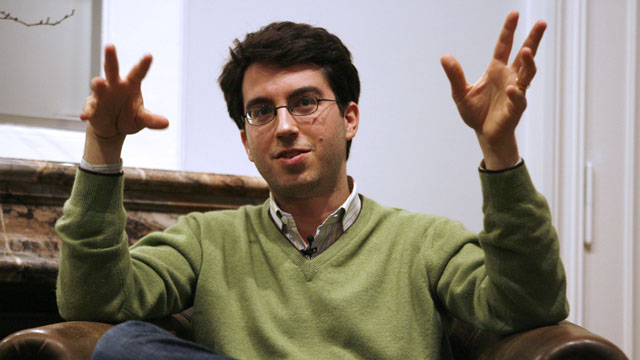Culture & Religion
All Stories
“The worst of times for politics and media has been the best of times for The Daily Show’s host—and unfortunately things are getting even funnier.” New York Magazine profiles the comedian.
“Football tells us that violence can be beautiful when performed for the sake of a greater good.” The Atlantic’s Hampton Steven’s offers an ‘intellectual’s defense of football’.
When you smell a ripe strawberry or your morning coffee, what you’re really smelling are hundreds of molecules, says fine fragrance perfumer Chistophe Laudamiel. But that doesn’t mean the brain […]
“A result of a certain kind of overparenting, we are learning, is children who are better prepared for college but less prepared for life.” Lisa Belkin says parenting has become too sacred.
“The loss of linguistic diversity means permanently shutting the door on a vast wealth of potential scientific knowledge.” Obit’s Axel Rose on the downside of English as lingua franca.
“There’s a better reason for the non-fanatical to return to an antiquated medium like vinyl. Listening to music on a computer or iPod via headphones has become the ultimate in anti-social activities.”
“What explains the ascendance of Homo sapiens? Start by looking at our pets.” The Boston Globe says our ability to domesticate and control other species accounts for our formidable rise.
“How does one come to have certain ideas about L.A. without actually experiencing it?” n+1 meditates on the sun, fun and doom captured in the novels of Bret Easton Ellis.
“Artists know as well as anybody that music sells stuff, so why shouldn’t they sell the stuff too?” Rob Walker says musicians no longer lose credibility by marketing products.
Novelist Jonathan Safran Foer wants you to stop eating meat—not because he cares so much about the fluffy animals, but because it’s killing the environment. In his Big Think interview Foer shared with us just how devastating the factory farm industry is, something he learned while researching his first work of non-fiction, Eating Animals. “Animal agriculture is the number one cause of global warming, and yet very few people, including people who are normally quite political and quite moral and moralizing, talk about it. And even fewer people act on their concerns about where food comes from.”
The reason changing Americans’ eating habits is so difficult is because eating meat is ingrained in our cultural narratives as Americans. “Food is not just fact and it’s not just reason; it’s culture, it’s personal identity,” Foer says. “It’s what our parents and our grandparents fed us, it’s how we think of ourselves, and it’s always attached to some kind of a story. And that confuses things. The Thanksgiving turkey confuses things. The Christmas ham confuses things. Every family has its own version.”
And creating a new narrative that excludes meat will be tough largely because Americans are subsidized to eat this way. American farm subsidies lower the price of meat while encouraging inhumane and environmentally damaging farming practices, so much so that the real cost of a 50-cent hamburger, factoring in environmental costs, is actually $200. Plus, the subsidies hamstring farmers that use traditional, non-industrial methods of farming: “We have now created an economic system which is very advantageous to feed animals unnaturally, house them unnaturally, and raise genetic stocks that are destined for illness,” Foer says. “And the small farmers, who are really the heroes of my book, farmers at places like Niman Ranch, farmers like Frank Reese at Good Shepard, farmers like Paul Willis, are at a severe economic disadvantage for doing things the right way; for being environmentally responsible; for treating their animals like animals rather than like rocks or pieces of wood.”
Foer told us that change is very necessary but possible, debunking the idea that industrialized factory farming is necessary to feed the world. The idea that factory farming is necessary to feed the nearly 7 billion inhabitants of earth is “not only untrue, it’s the opposite of the truth,” he says. “It takes seven calories of food input into an animal to produce one calorie of food output. It’s an extraordinarily inefficient way to produce food.” And if the Chinese and Indians begin to eat like American do, which has been the trend in the developing world, “we’re going to have to farm twice as many animals as we do now.” That would amount to 100 billion animals every year.
Foer also spoke to us about his fiction work, telling us that he values the freedom of fiction but that the same freedom is what makes fiction so difficult. And he gave us his take on the film adaptation of his debut novel “Everything Is Illuminated” as well as his thoughts about the form of the novel in the age of the iPad. Literature has always been “slower than the other art forms to grapple with technological and cultural changes…and I think that’s one of the things that people love so much about it,” he said. Whereas music and the visual arts have changed dramatically in the past 100 years, literature has remained largely the same. “Maybe it’s been the saving grace of literature to be so conservative,” Foer muses. “But maybe it will contribute to its death.”
“The role of Latinos in American society is growing inexorably, with big political implications for the future.” The Economist reports on the Hispanicisation of America from the southwest.
“The narrative of men rejecting metrosexuality and reclaiming their manhood makes perfect marketing sense.” Douglas Haddow says being a man’s man is the next trend in manhood.
“The sequel to the 30-year-old ‘The Official Preppy Handbook’ reminds us that you don’t necessarily need to have money to have class.” Columnist Megham Daum on her favorite book.
Enjoying a piece of music or recognizing the face of a loved one seems like a simple, instantaneous process. But like all things associated with the brain, they aren’t. Both […]
“We have entered the post-art era, Kundera declares in Encounter—’a world where art is dying because the need for art, the sensitivity and the love for it, is dying.’”
“Most artists have shied away from 9/11 as a theme in recent years, and who can blame them?” Art critic Richard Woodward says artists should again take on the events of 9/11.
Forget height and social status when you are on the dance floor, it is all about how you move. New research identifies the dance moves that make men most attractive to women.
Who decides what “insane” means? This was the major question of Ken Kesey’s countercultural classic “One Flew Over the Cuckoo’s Nest,” which illustrated how mental illness could be deployed by […]
Rising jazz pianist Vijay Iyer, whose doctoral thesis was a study of musical cognition and the movement of the body, draws inspiration from past jazz masters as well as the field of physics.
When a journalist mistakenly wore shorts to visit Guantanamo Bay, he was refused entry into the prison. Instead, he was taken to the library where the prisoners’ art was hung on display.
As California prepares to vote on a ballot initiative essentially legalizing marijuana, The Atlantic looks at the pop music—from Louis Armstrong to Ben Harper—that found peace with the drug.
Nicholas Rombas at n+1 reviews films as an homage to French surrealists André Breton and Paul Éluard by walking into theatres randomly and leaving as soon as the plot makes sense.
In 1895 Sigmund Freud and Josef Breuer published “Studies on Hysteria,” a series of case studies of female patients with bizarre symptoms that had no obvious biological cause. Some patients […]
A new book tells the story of how a Parisian perfume magnate persuaded Proust’s family not to destroy his effects, among which were his manuscripts and famous overcoat.
“Being a child of a rock legend brings kudos, travel and famous friends—but fatherly wisdom and bedtime stories are rarely part of the deal.” The Independent reports on famous families.
“One of the advantages of looking back on Asimov’s work from the remove of several decades…is that one can see how deeply enmeshed he was in the history of his own time.”
Hoping for a workable alternative to using ‘he or she, him or her’? Dennis Baron says wordsmiths have long been coining gender-neutral pronouns, all to no avail.
“It’s possible to demean oneself by sinking to the level of those who promiscuously accept any sort of apology.” The New Yorker meditates on the politics of giving and accepting apologies.
A field not traditionally considered profitable by men, women are taking the Pakistani art market by storm. Female artists and curators and gaining international exposure as a result.
More fast growth among global for-profit universities seems probable and the number of globally mobile students is likely to surge as higher education’s globalization continues.




